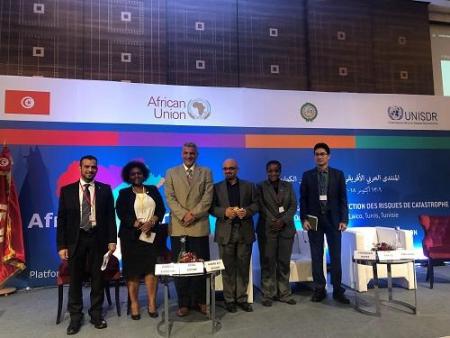
Panellists at the World Tsunami Awareness Day session at the Africa-Arab States Platform on Disaster Risk Reduction
By Brigitte Leoni
TUNIS, October 12, 2018 - Tsunami risk may be low in the African and Arab States but it is increasing as more and more infrastructure is located and built along the Mediterranean coast,small islands and other tourist hot spots.
That is the consensus among seismic experts meeting at the Africa-Arab States Platform on Disaster Risk Reduction which is underway in Tunis, Tunisia.
Denis Chang Seng, a tsunami expert with the Inter-Oceanographic Commission, UNESCO, said: “Between 1966 and 2010, some 240 million people lived around the Mediterranean. In 2010 this population increased to 480 million and is expected to reach 637 million by 2025, and this figure does not include the millions of tourists who are visiting the region every year and who would also be exposed.”
Mr. Chang Seng told a gathering to raise awareness that “exposure is growing and the region can expect huge economic losses if better early warning systems are not put in place along with more systematic risk assessments and awareness programmes to educate communities on tsunami risks.
Opening the session, UNISDR Director, Kirsi Madi, said: “ Tsunamis are rare events, but they are also the most deadly and costly of natural hazards.”
In 2004, the Indian Ocean Tsunami killed more than 228,000 people and caused over $10 billion damage mostly in Asia but it also reached East African countries such as Somalia, Tanzania, Kenya and Seychelles, causing significant damage and some loss of life.
The lack of preparedness and the absence of early warning systems were the main reasons for the damage caused by the tsunami in the affected regions.
Countries in North Africa such as Egypt, Algeria, Morocco and Tunisia are also very vulnerable to tsunamis due to their exposure to seismic activity, stated Prof. Ahmed Aly Aly Badawy, Head of Seismology Department, Egyptian National Seismic Network.
“Tsunamis have happened in the past and earthquakes are frequent in Egypt. We are working with different sectors and scientists to build resilience and informing different actors on their risks. We hope that we will manage to reduce seismic and tsunami risks in the future as more infrastructure are built along our coasts,” he said.
Many countries in the region have already taken action to anticipate future risks and reduce tsunami risks.